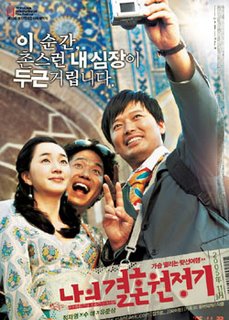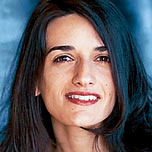[koreans in uzbekistan]
 There is a beautiful shot about a quarter of the way through the South Korean film Wedding Campaign that captures as well as anything the dislocating loneliness of the foreign. Man-taek, an aging bachelor farmer who has come to Uzbekistan in search of a wife, is standing at his hotel window, gazing out into the Tashkent night; a trolley crawls along the street below, its cables giving off irregular showers of blue-white sparks that light up the empty, alien street. The dancing shadows, the sensation that even light has become something strange and incomprehensible, sent a little chill of recognition through me, and I thought of our first night in Korea, gazing out the car windows at hundreds upon hundreds of red neon crosses floating in the night, their meaning obscure.
There is a beautiful shot about a quarter of the way through the South Korean film Wedding Campaign that captures as well as anything the dislocating loneliness of the foreign. Man-taek, an aging bachelor farmer who has come to Uzbekistan in search of a wife, is standing at his hotel window, gazing out into the Tashkent night; a trolley crawls along the street below, its cables giving off irregular showers of blue-white sparks that light up the empty, alien street. The dancing shadows, the sensation that even light has become something strange and incomprehensible, sent a little chill of recognition through me, and I thought of our first night in Korea, gazing out the car windows at hundreds upon hundreds of red neon crosses floating in the night, their meaning obscure.Wedding Campaign — the Korean title, Naui Gyeolhon Wonjeonggi (나의 결혼 원전기), more literally translates to "My Arranged Marriage" — is the story of Man-taek (Jeong Jae-yeong/정재영) and his best friend Hee-chul (Yu Jun-Sang/유준상), a taxi driver. They are nearing 40 and unmarried, a near-hopeless situation in Korea, especially in the countryside, whose towns have come to resemble old-age colonies as the young have migrated to Seoul in search of education and opportunity. The opening scenes, which are very funny, introduce us to Man-taek's aimless, pathetic life of nocturnal emissions, drunken binges and bad karaoke over civil-defense loudspeakers.
Fate intervenes when Man-taek's grandfather discovers a mysterious being who speaks Korean but looks white, or sort of white, and has to ask about the meanings of certain words. It turns out this strange creature is the new wife of someone in town and is from an unpronounceable place far away: Ooz-bek-eess-tuh? Something like that. Soon Hee-chul is arranging a journey for the two bachelors, through an expensive matchmaking service, to this mysterious country far away where there are Koreans who apparently want to marry aging men from the motherland so they can move there. (The film gives a cursory explanation of how Koreans ended up in Uzbekistan: basically, Stalin deported 172,000 ethnic Koreans from the Far East to Central Asia in 1937 as part of his broader policy of genocide through deportation.)
Once the pair arrives in Tashkent, along with two other bachelors whose stories (and terrible suits) provide additional comedy, there are plenty of twists, turns and complications, but it's obvious from very early on that Man-taek will forgo the various pretty girls paraded in front of him in favor of his translator, Kim Lara (Ae Su/애수). Indeed, the film falls back on a number of romantic-comedy conventions — the oaf who turns out to be loveable, the agonized howling of separated lovers, the inevitable romantic success of the protagonists — but there are two things that make it all hold together. The first is the unusual plot and setting, involving not just the community of Korean Uzbeks, but also the sleazy business of marriage-fixing for the sake of visas and the precarious situation of Kim Lara, who turns out to be a North Korean refugee who hopes to earn enough to buy a forged South Korean passport. The film was actually shot in Tashkent, and the strangeness of Koreans among mosques, and of mosques among Soviet buildings, lends an atmosphere of unpredictability.
The second strength of the movie is Jeong Jae-yeong's performance as Man-taek. I've always been annoyed by movies about losers or unpopular girls who suddenly get a makeover and get the boy or girl of their dreams, because the character in the initial loser phase is usually played by an attractive, talented actor and is typically more attractive and fun than your average real-world non-loser. The actor just has to switch gears, from playing an oaf to playing a romantic lead, which is something that any capable actor should be able to do.
Jeong Jae-yeong manages to avoid this clichá by playing an oaf who remains an oaf, yet somehow manages to be believably attractive to Kim Lara. Man-taek never ceases to be the sweaty, stuttering, stubborn, sloppy-eating, binge-drinking fool, yet he manages throughout to express an underlying dignity that the audience believes well before Kim Lara falls in love with him.
Adding to the believability of the central romance is the film's layered examination of what it means to be alone and alienated. Man-taek is never alone — he has a best friend and a family and lives in a small town — but he is nevertheless a man apart, aging into a role for which his society has little respect. His experience of Uzbekistan is, of course, all about being somewhere alien, while Kim Lara, as a North Korean refugee, is also alone in the world, living in fear of discovery by the authorities.
That Lara is North Korean adds to the layers of alienation. In some sense, the Uzbek Koreans are a proxy for the lost Koreans of the North: a group of people who are Korean in a way that is recognizable to South Koreans, yet who are obviously from a different world. There's a touching moment when Kim Lara takes Man-taek to a Korean restaurant, where the half-starved bachelor wolfs down a meal that is at last familiar. He asks Kim Lara what she thinks of the food and whether it's too spicy for her (Koreans rightly believe that a lot of foreigners can't handle the amount of pepper paste they slather on everything). She says it's delicious, using the formal mode. Man-taek corrects her, telling her she should say it in the informal mode appropriate between friends. Then he grins, with a mouth full of food, and declares that he's never taught anyone anything before. Kim Lara tells him that whoever he takes back with him to Korea, he should teach her all about South Korean manners and customs.
The obvious emotional subtext, of course, is that Kim Lara secretly wants to be that woman. Less obvious, but perhaps more important, is her own sense of awkwardness in terms of South Korean manners, to the point that a South Korean could mistake her for someone foreign-born. Has the North really drifted so far from the South? It's hard to know for sure, but we are approaching the time when there will be no one left alive who remembers Korea as a unified entity. (Even today, Koreans who remember an undivided Korea are recalling not a unified independent country but an annexed territory of Japan.) As the language of each country moves in its own direction, as the cultures drift ineluctably apart, will North Koreans become as foreign as Korean Uzbekistanis?
I don't think they will, but Wedding Campaign manages to hit on a number of Korea's fears: that its farms will be abandoned, that the countryside will be emptied of young people, that the population as a whole is aging too rapidly, that the North is drifting away. Still, these themes never weigh down the movie, which stays funny and light on its feet while giving its main characters enough depth and complexity to keep the viewer sympathetic. If you have the chance, go see the second showing this Sunday afternoon at BAM Cinematek.






 Yesterday, out of the blue, I got a message on Friendster from an old high school friend,
Yesterday, out of the blue, I got a message on Friendster from an old high school friend,  Hard Rock Hallelujah (
Hard Rock Hallelujah (
 PepsiCo has
PepsiCo has 
